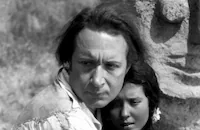Arkansas Judge
Cast & Crew
Frank Mcdonald
Weaver Brothers [leon And Frank] And Elviry
Roy Rogers
Spring Byington
Pauline Moore
Frank M. Thomas
Film Details
Technical Specs

Synopsis
At a celebration in Peaceful Valley, Arkansas, Judge Abner Weaver states that he founded the town forty years ago to establish a community where the ninth commandment, "Thou shalt not bear false witness against thy neighbor," would reign supreme. Joining the party is Tom Martel, Abner's foster son, who has just returned from law school. Tom is the focus of a rivalry between Abner's daughter Margaret and town banker August Huston's daughter Hettie, who sees Tom as her ticket out of the small town. Hettie arrives wearing an expensive gown and succeeds in attracting Tom's attention, but the festivities are interrupted by the Widow Smithers, who announces that fifty dollars has been stolen from her flour barrel and accuses Mary Shoemaker, a hard-working scrubwoman who does odd jobs for everyone. Abner warns everyone not to speculate when there is no evidence, while Huston worries about how Hettie got the money for her gown. The next day, Abner's brother Cicero tells Elviry, Abner's wife, that he saw Hettie sneaking out of the widow's house before the party. Soon a rumor that Hettie stole the money sets neighbor against neighbor as everyone takes sides. At a church social that night, Huston engineers a proposal to give the widow fifty dollars from church funds and pardon Mary for the theft. When Abner points out that a pardon will imply that Mary is guilty, Huston twists his words into an accusation against Hettie. Huston storms out of the meeting and, desperate to protect Hettie's reputation, pressures newspaper editor Henry Marsden to publish an editorial condemning Mary. After the paper is distributed, the angry townspeople dismiss Mary from her various jobs, and when the widow finds fifty dollars in her flour barrel, Huston states that the ostracism forced Mary to return the money. However, when Elviry notices that the bills are not the same, the townspeople again conclude that Hettie is the thief. Soon after, Huston tries to persuade Abner to send Mary away, and when Abner refuses, Huston brings a slander suit against him in Hettie's name. When Margaret asks Tom to defend Abner, he says that because he is now engaged to Hettie, he cannot. At the trial, witness after witness testifies that Abner accused Hettie, but Abner merely states that he is not guilty. Tom finally jumps to Abner's defense and in his cross-examination, proves that each of the witnesses is beholden to Huston in some way and their testimony is therefore suspect. Hettie's lawyer then calls Margaret to the stand and, saying that Abner accused Hettie in order to destroy Tom's interest in her, forces Margaret to admit that she is in love with Tom. The judge rules in Hettie's favor and the Weavers are forced to put their house up for sale to pay the settlement. While the Weavers are packing their belongings, the townspeople decide to run Mary out of town and go to Mary's house, which they set on fire when she does not answer their yells. The Weavers and Tom drive by and, seeing Mary's dog in the window, realize that Mary must be trapped. Tom rescues her, and Hettie, overcome by guilt upon seeing the stricken woman, confesses that she stole the widow's money. Mary recovers, and Huston agrees to rebuild her home. Soon after, everyone sings at a community gathering and Peaceful Valley is peaceful once again.

Director
Frank Mcdonald
Cast
Weaver Brothers [leon And Frank] And Elviry

Roy Rogers

Spring Byington
Pauline Moore
Frank M. Thomas

Veda Ann Borg

Eily Malyon
Loretta Weaver
Minerva Urecal
Beatrice Maude
Harrison Greene
Barry Macollum
George Rosener

Monte Blue
Frank Darien

Russell Hicks
Edwin Stanley
Gladden James
Crew
A. P. Carter
Cy Feuer
Phil Ford
Ian [mclellan] Hunter
Ring Lardner Jr.
John Victor Mackay
Dorrell Mcgowan
Stuart Mcgowan
Ernest Miller
Ernest Nims
Adele Palmer
Gertrude Purcell
Willard Robertson
Carson J. Robison
Armand Schaefer
Murray Seldeen
Al Wilson

Film Details
Technical Specs

Quotes
Trivia
Notes
A working title of this film was Arkansaw Judge. The picture marked the first time that one of author Irving Stone's novels was adapted for the screen. For additional information on films starring the Weaver Brothers and Elviry, please see the entry for Down in Arkansaw (see AFI Catalog of Feature Films, 1931-40; F3.1113).












